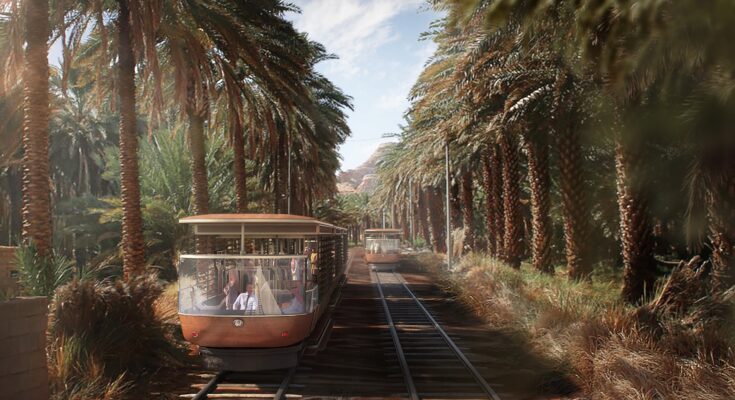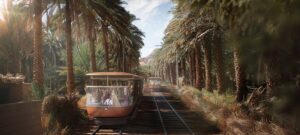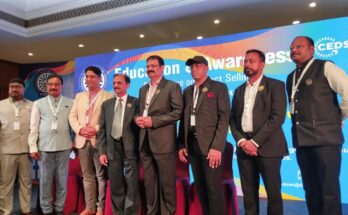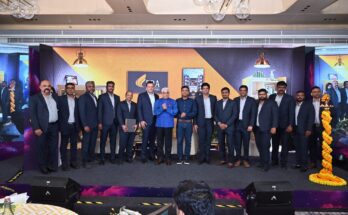The Journey Through Time Masterplan marks a major step in protecting
The Journey Through Time Masterplan marks a major step in protecting and sharing the AlUla cultural and heritage site with the world
Five unique districts, connected by a 20km-long public realm called the Wadi of Hospitality, will protect 200,000 years of natural and human history across the 20km-long core historical area of AlUla, a unique cultural land scape located in north-west Arabia, encompassing a wadi (seasonal river valley) and culminating in the Naba tae an city of Hegra, a UNESCO World Heritage Site. The first masterplan in a series for AlUla is conceived as a Liv ing Museum and includes 15 new cultural assets, a 9km rejuvenated Cultural Oasis, 10 million square meters of green and open spaces, and a 46km low-carbon tramway, while contributing to AlUla’s hospitality offer with 5,0 00 additional hotel keys.
India, April 2021:His Royal Highness the Crown Prince Mohammed bin Salman, Chairman of the Royal Commi ssion for AlUla, today launched The Journey Through Time Masterplan for AlUla, Saudi Arabia that will immerse visitors in 200,000 years of natural and human history.
The Journey Through Time design and spatial visionary masterplan sets out a 15-year programme to responsibly and sustainably develop the core historical area of AlUla, a unique cultural landscape located in north-west Ara bia.
The plan contributes to the advancement of Saudi Arabia’s Vision 2030, opening a new chapter in the develop ment of AlUla as a Living Museum while accelerating the growth of a diversified economy and vibrant comm unity.
The Journey Through Time Masterplan will transform AlUla into a global destination for heritage, nature, art and culture. Key features of the plan are:
- Five districts spanning the 20km heart of AlUla will serve as waypoints on the Journey Through Time, from Old Town in the south to Hegra Historical City in the north, each shaped by the site’s natural and cultural heritage. The districts are: AlUla Old Town (District 1); Dadan (District 2); Jabal Ikmah (District 3); Nabataean Horizon (District 4) and Hegra Historical City (District 5).
- The districts will each focus on an existing heritage site and will be traversed by AlUla’s ancient oasis. A 9km portion, constituting the heart of the Cultural Oasis, will be fully rejuvenated, starting in AlUla Old Town.
- Fifteen new cultural assets including museums, galleries and cultural centres will serve as landmarks across each district (full list of assets is appended in the Journey Through Time Factsheet).
- The 20km Wadi of Hospitality running along the ancient oasis’s bed will connect the five districts and act as the green pedestrian ‘spine’ of The Journey Through Time.
- A 46km low-carbon tram line will connect AlUla International Airport to the five districts. A scenic roadway as well as bicycle, equestrian and pedestrian trails will promote a smooth and experiential approach to mobility, championing low-carbon journeys.
- The wadi and the low-carbon tramway will mostly follow the route used by pilgrims on the Hijaz Railway for many centuries before, ensuring a memorable visual and interpretive experience of the transition from oasis to desert.
- Adding a total of 5,000 additional room keys into the overall target of 9,400 keys by 2035, each district will offer its own tailored blend of living and hospitality options, ranging from hotels and eco-tourism resorts to luxury lodges and canyon farms carved into the sandstone rocks.
- The Kingdoms Institute, a flagship component of the plan, will be a global hub for archaeological knowledge and research dedicated to the cultures and civilisations that have inhabited this area for more than 7,000 years, including the ancient kingdoms of Dadan and Lihyan and the magnificent Nabataeans, who built the city of Hegra, a UNESCO World Heritage Site.
The Journey Through Time Masterplan was developed under the leadership of HRH the Crown Prince and the guidance of HH Prince Badr, the Saudi Minister of Culture and the Governor of the Royal Commission for AlUla (RCU). The Journey Through Time Masterplan was envisioned as a way to capture the deep-rooted essence of what AlUla already is – an oasis of unique culture, heritage, nature and community – while curating a timeless legacy with stories of the past to inform the future and open new chapters in AlUla’s unfolding history.Each district of The Journey Through Time Masterplan is a cultural landmark in its own right and reflective of the singular and ever-evolving history, topography and nature that is unique to that particular location. This spatial system of highly differentiated villages, experiences and cultural assets is designed to be visitor-centric and rewards more immersive discovery, exploration and longer stays.
Symbolising Saudi Arabia’s renewed commitment to the preservation and protection of world heritage, knowl edge and research, the masterplan is backed by extensive scientific studies on AlUla’s human patterns, environ mental and geological evolution, developed by a team of international and Saudi experts.As a direct response to the challenges of sustainably and responsibly developing a fragile desert environment, the replenishment of the 9km core Cultural Oasis – through research and innovative solutions – will be a key element of the masterplan. Contributing to the Saudi Green Initiative, the regeneration of AlUla is underpinned by a strategy to rehabilitate the land and reverse the course of desertification in the area. Enabling a major expansion of AlUla’s green and open spaces up to 10 million square meters, it will provide a haven for AlUla’s archaeological sites, an oppo rtu nity for sustainable agricultural production as well as an enchanting experience for visitors.
Together, two flagship projects of the masterplan – the Kingdoms Institute and the Cultural Oasis – reflect Saudi Arabia’s commitment to offer the world a viable model for protecting, preserving and contributing to the world’s cultural and natural legacy.Creating a new, balanced view of concepts such as protection, conservation, restor ation, regeneration and development, the AlUla Sustainability Charter sets the ground for an innovative and integrated approach to sustainability. The Charter includes, at the heart of the masterplan, a zero-carbon policy coupled with circular economy principles, and robust resiliency policies around development in heritage and environmentally sensitive areas, as well as flood and improved water management and vegetation planting.
First and foremost an investment in AlUla’s citizens and their future, the masterplan embodies RCU’s commi tment to community inclusivity. Fully embedded within the plan, new community-driven services, amenities as we ll as cultural and educational facilities will together create a stronger tourism, cultural and agricultural econo my for AlUla. The economic growth will not only grow AlUla’s pool of talents within a local community that has acted as guardians of ancestral values, techniques, and traditions over millennia, it will also nurture a thriving and vibrant society in a great place to live, work and explore.The Journey Through Time Masterplan is the first in a series of plans for AlUla and constitutes the first and most important part of AlUla’s development. It will be impl emented in three phases until 2035, while the first phase is set to be completed by 2023, aiming to provide a comprehensive visitor-centric experience.
Upon completion of the wider development strategy for AlUla in 2035, 38,000 new jobs amid a population gro wn to 130,000 will have been created while AlUla will contribute SAR 120 billion to the Kingdom’s GDP (USD 32 billion). Additionally, 80 percent of AlUla County will have been designated as nature reserves with key flora and fauna reintroduced.It will achieve this through income generated by welcoming two million visitors annually, off ering 9,400 hotel keys in total, and further promoting agriculture, arts and culture and tourism as key economic drivers for AlUla. Unique opportunities will further encourage and accelerate business and investment from par tners who share RCU’s values of sustainability, responsible development and community inclusivity.
For media enquiries please contact the RCU Public Relations team at






